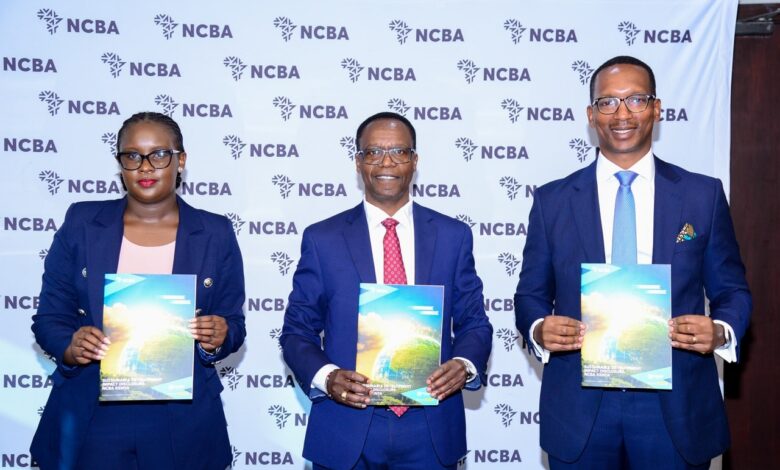
NCBA Group has officially published its first Sustainable Development Impact Disclosure (SDID) Report, adopting the Impact Disclosure Guidance framework introduced in October 2024. This milestone makes NCBA the first African financial institution to apply these new sustainability reporting guidelines.
The report was developed in partnership with global investment banks J.P. Morgan and Blaylock Van, reinforcing NCBA’s commitment to fostering transparency, accountability, and sustainability in financial services.
Pioneering a New Sustainability Reporting Standard
NCBA is a member of the Impact Disclosure Taskforce, a network that guides financial institutions and capital market participants in creating a structured impact measurement and monitoring framework. This framework ensures that entities report sustainability goals transparently and contribute meaningfully to global development targets.
"We collaborated with J.P. Morgan and Blaylock Van so that we could draw from their wealth of experience. We are committed to acting beyond rhetoric to build a legacy of sustainability that will resonate for generations to come. Transparency, accountability, and consistency in reporting are essential to driving this commitment." — John Gachora, Group Managing Director, NCBA
NCBA’s Sustainability Strategy: Key Commitments
NCBA’s Sustainable Development Impact Disclosure Report highlights its contributions to 10 United Nations Sustainable Development Goals (SDGs), including:
- No Poverty (SDG 1)
- Quality Education (SDG 4)
- Gender Equality (SDG 5)
- Clean Water and Sanitation (SDG 6)
- Affordable and Clean Energy (SDG 7)
- Decent Work and Economic Growth (SDG 8)
- Industry, Innovation, and Infrastructure (SDG 9)
- Responsible Consumption and Production (SDG 12)
- Climate Action (SDG 13)
- Life on Land (SDG 15)
Under its sustainability program ‘Change the Story’, launched in August 2023, NCBA has already made strides in social impact initiatives. The bank provided scholarships worth KES 11.1 million to support underprivileged students as part of its commitment to education and financial inclusion.
Financial Inclusion, Green Financing, and Environmental Commitments
The SDID report outlines NCBA’s long-term sustainability vision, which includes:
- Mobilizing KES 30 billion to support green and sustainable financing
- Planting 10 million trees by 2030 to enhance environmental conservation
- Eliminating single-use plastics and achieving 100% waste recycling by 2030
- Strengthening financial inclusion through accessible and innovative banking solutions
- Enhancing operational sustainability across its markets in Kenya, Uganda, Tanzania, Rwanda, and Ivory Coast
The report also includes an impact reporting template that will enable continuous monitoring of the bank’s sustainability initiatives.
Industry Reactions: A Game-Changer in Impact Finance
Blaylock Van’s Perspective
"NCBA’s leadership in publishing the SDID marks a significant milestone, setting a new benchmark for transparency and accountability. This initiative provides investors with a powerful tool to understand NCBA’s impact strategy, ultimately driving progress toward the UN Sustainable Development Goals." — Nyagaka Ongeri, President, Blaylock Van
J.P. Morgan’s View
"NCBA is a pioneer in producing an SDID for its business in Kenya. This report establishes its commitment to reporting progress against sustainability plans, further strengthening its engagement with impact-focused investors in global capital markets." — Sailepu Montet, Chief Representative Officer, J.P. Morgan
Expanding the Framework Beyond Kenya
NCBA has plans to expand its Sustainable Development Impact Disclosure framework beyond Kenya. Future editions will integrate sustainability reporting across its operations in Tanzania, Rwanda, Uganda, and Ivory Coast, ensuring a consistent, measurable approach to sustainable development across the region.
A New Era for Sustainable Finance in Africa
NCBA’s adoption of the Impact Disclosure Guidance aligns with the global shift toward sustainable finance and responsible banking. The guidelines, developed by the Impact Disclosure Taskforce, are designed to help financial institutions disclose their sustainability impacts transparently, empowering global investors and stakeholders to make informed financing decisions based on reliable, publicly available data.
Conclusion
With this move, NCBA is setting a precedent for African financial institutions in sustainable finance reporting. The Sustainable Development Impact Disclosure Report serves as a structured framework guiding the bank’s climate action, social impact initiatives, and financial inclusion efforts.
By making sustainability a measurable and accountable commitment, NCBA is demonstrating how African banks can lead in delivering transformative solutions that support economic growth, protect the environment, and enhance social well-being.





